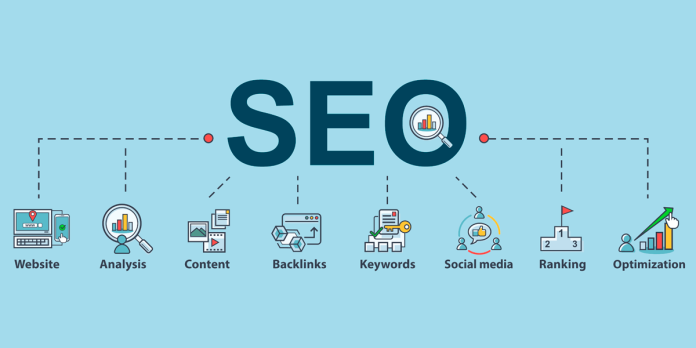Optimizing on-page SEO is a crucial aspect of any small business’s digital marketing strategy. By focusing on the content and structure of your website, you can improve its visibility in search engine results pages (SERPs) and drive more organic traffic to your site.
One essential component of on-page SEO is conducting keyword research. This involves identifying relevant keywords that potential customers are searching for online. By incorporating these keywords strategically into your website’s content, meta tags, and headings, you can increase your chances of ranking higher in SERPs.
Another important factor in on-page optimization is building a logical site structure. This means organizing your web pages in a way that is easy for both users and search engines to navigate. A clear hierarchy helps search engines understand the context and relevance of each page, improving their ability to rank it appropriately.
In addition to optimizing the technical aspects of your website, it’s crucial to focus on creating high-quality content. Your content should be informative, engaging, and tailored to meet the needs of your target audience. By delivering valuable information through well-written blog posts or product descriptions, you can attract more visitors to your site while establishing credibility within your industry.
Obtaining backlinks from relevant websites also contributes significantly to on-page SEO optimization. When authoritative sites link back to yours as a reliable source or reference point for information related to their niche or industry – this signals search engines that your website carries authority too.
Last but not least; implementing technical SEO practices such as optimizing page load speed and ensuring mobile-friendliness will help provide an optimal user experience that not only encourages visitors but also satisfies Google’s algorithmic requirements resulting in better rankings overall.
By focusing on these key elements of on-page SEO – keyword research, content creation, site structure, and optimization – small businesses can enhance their online presence by making their websites more visible in organic search results.
Obtaining backlinks from relevant sites
Obtaining backlinks from relevant sites is a crucial aspect of small business SEO. Backlinks serve as a vote of confidence for your website, signaling to search engines that your content is valuable and trustworthy. However, not all backlinks are created equal.
When it comes to acquiring backlinks for your small business website, quality should always be prioritized over quantity. It’s important to focus on building links from reputable and relevant websites within your industry or niche. These types of backlinks carry more weight in the eyes of search engines and can significantly improve your organic rankings.
One effective strategy for obtaining relevant backlinks is through outreach. Reach out to other businesses or influencers in your industry and offer them valuable content that they can link back to on their own websites. This could include guest blog posts, expert interviews, or informative resources.
Another tactic is leveraging local partnerships by collaborating with complementary businesses in your area. For example, if you run a bakery, you could partner with a local coffee shop and create cross-promotional opportunities that involve linking to each other’s websites.
Additionally, participating in industry forums or online communities can also lead to valuable backlink opportunities. By actively engaging in discussions and providing helpful insights, you can establish yourself as an authority figure within your field and increase the likelihood of others linking back to your website.
Remember that building high-quality backlinks takes time and effort but pays off in long-term SEO success for small businesses.
Implementing technical SEO
Implementing technical SEO is a crucial aspect of optimizing your small business website for search engines. It involves making changes to the backend of your site to improve its performance and make it more accessible to search engine crawlers. Here are some key steps you can take to implement technical SEO effectively.
Ensure that your website has a fast loading speed. Slow websites not only frustrate users but also receive lower rankings from search engines. Optimize images, minimize code, and leverage caching techniques to enhance the speed of your site.
Next, make sure that your website is mobile-friendly. With an increasing number of people using smartphones and tablets for browsing, having a responsive design is essential. This ensures that your site displays properly on all devices and provides a positive user experience.
Additionally, optimize your site’s URL structure by using descriptive keywords instead of generic numbers or symbols. This helps search engines understand what each page is about and improves its chances of ranking higher in relevant searches.
Furthermore, create an XML sitemap for your website and submit it to search engines like Google. A sitemap helps search engine crawlers navigate through all the pages on your site easily, ensuring that they are indexed correctly.
Regularly monitor and fix any broken links on your website. Broken links not only harm user experience but also negatively impact SEO efforts as they indicate poor maintenance.
By implementing this technical SEO in Clearwater practices effectively, you can improve the visibility of your small business website in organic search results and drive more targeted traffic to grow your online presence!
Writing high-quality content
Writing high-quality content is crucial for small businesses to succeed in their SEO efforts. When it comes to creating content, it’s important to keep your target audience in mind and provide them with valuable information that meets their needs. Start by conducting thorough research on the topics you plan to write about, ensuring that you have accurate and up-to-date information.
Next, focus on crafting engaging headlines and introductions that grab the reader’s attention. Use relevant keywords naturally throughout your content, but avoid keyword stuffing, as this can negatively impact your SEO rankings. Instead, strive for a balance between readability and optimization.
Make sure your content is well-organized and easy to navigate. Break up long paragraphs into shorter ones for better readability. Utilize subheadings, bullet points, and numbered lists to make your content more scannable.
Incorporate visuals such as images or infographics to enhance the visual appeal of your content. This not only makes it more visually appealing but also helps break up text-heavy sections.
Always proofread and edit your content before publishing it. Check for grammar errors, and spelling mistakes, and ensure proper formatting throughout.
By consistently producing high-quality content that resonates with your target audience, you can attract more organic traffic to your website while establishing yourself as an authority in your industry.
Monitoring SEO performance
Monitoring SEO performance is crucial for small businesses to ensure that their efforts are yielding the desired results. It involves regularly tracking and analyzing various metrics to gauge the effectiveness of their SEO strategies. By monitoring SEO performance, small businesses can identify areas that need improvement and make data-driven decisions to optimize their online presence.
One important aspect of monitoring SEO performance is tracking keyword rankings. Small businesses should keep an eye on how well their target keywords are performing in search engine results pages (SERPs). This helps them understand if they are ranking higher or lower over time and allows them to adjust their optimization efforts accordingly.
Another metric to monitor is organic traffic. By analyzing the amount of organic traffic coming to their website, small businesses can determine whether their SEO efforts are driving more visitors from search engines. They can also track which pages receive the most organic traffic and optimize those further to increase conversions.
Backlink analysis is another critical component of monitoring Clearwater SEO performance. Small businesses should regularly assess the quality and quantity of backlinks pointing to their website. Monitoring backlinks helps identify any toxic or spammy links that could harm their site’s rankings and take necessary action such as disavowing those links.
Furthermore, monitoring user engagement metrics like bounce rate, time on page, and conversion rates provides insights into how visitors interact with a small business’s website. High bounce rates may indicate issues with site design or content relevancy, while low conversion rates may suggest problems with call-to-actions or checkout processes.
In addition, keeping an eye on competitors’ SEO performance can provide valuable insights for small businesses looking to improve their own strategies. Analyzing competitors’ keyword rankings, backlink profiles, content strategies, and social media presence can help identify opportunities for differentiation or improvement.
Regularly reviewing these metrics allows small businesses not only to measure the success of their current tactics but also adapt quickly in today’s dynamic digital landscape where algorithms change frequently.
Monitoring SEO performance empowers small businesses by providing them with the data they need to continuously optimize their SEO strategies for better visibility with Media Shark in Clearwater Florida!







